 Who was Saint Juan Macias OP?
Who was Saint Juan Macias OP?
St. Juan Macias lived from 1585 to 1645 and is often associated with two other more well-known Dominican saints. He lived at the same time as St. Martin de Porres and only 5 years after the death of St. Rose of Lima. Originally from Spain, he later traveled to the New World, and at the age of 37, he entered the Dominican convent of St. Mary Magdalene in Lima Peru as a lay brother. Lay brother is the term traditionally given by the Church to male religious in consecrated life. Since the 1950s, the Dominican Order now calls its non-ordained, or lay brothers, cooperator brothers. Based on canonization documents and Pope Paul VI’s homily celebrating his canonization, Juan was well known for two things. First, he was a man of prayer, a deep contemplative. He loved the Rosary, which he began to pray as a child in Spain and prayed consistently throughout his observant and penitential life as a Dominican. His deep prayer and ascetical life freed many souls from purgatory. Secondly, he was known for being poor, living out his vow of poverty as a consecrated religious and by his generosity to the poor, often serving 200 people a day while ministering as a porter for his Dominican community. St. Juan Macias was beatified with St. Martin de Porres in 1837 by Pope Gregory XVI and was canonized in 1975 by Pope Paul VI.
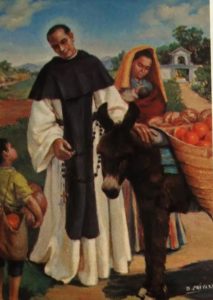 Asking, “did he preach?” Why is this such a crucial question?
Asking, “did he preach?” Why is this such a crucial question?
Father Gerard Timoner III OP, the current Master General of the Order of Preachers, emphasizes that preaching is both the identity for Dominicans and their mission; it is simultaneously who they are and what they do. Cooperator brothers, as non-ordained members of the Order of Preachers, are not sanctioned by ordination to preach from the liturgical pulpit during the sacred confines of the Catholic Mass. Determining how lay members of the Order, like St. Juan Macias, fulfill the preaching mission of the Order and how they live out the very essence of being a preacher, is a crucial distinction. It speaks to the very heart of what it means to be a Dominican, a preacher. Juan Macias, as a declared Dominican saint, is assumed to have lived out the fullness of his Order’s charism of preaching. Understanding how a non-ordained brother, who did not preach from the pulpit within the sacred confines of the Mass, can become a saint in the Order of Preachers, challenges the Church to re-imagine what it means by the term preaching. Is preaching a term to refer to only a few minutes of a homily given by the ordained minister during the mass? It must be more than this. Is preaching the external reach of living our lives as Christians, as a witness? It must be more narrow and specific than this.
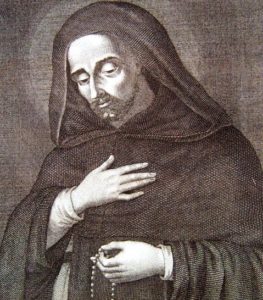 How do the Dominicans Understand Preaching?
How do the Dominicans Understand Preaching?
The Order of Preachers “was established, from the beginning, for preaching and the salvation of souls.” St. Dominic wanted his friars to be educated preachers so they might effectively refute the errors of heresy prevalent in his time. Dominicans embrace a life of study at the service of what is called the “Holy Preaching.” The Holy Preaching is not a discrete experience confined to a few minutes from the pulpit; rather for Dominicans, it is an expression of life shared in community. As a community, Dominicans seek to make a comprehensive and dynamic response to God’s presence in their lives and the world, going forth to preach the Good News of Jesus Christ in word and deed. By their religious profession, Dominicans become “fully committed to preaching the Word of God in its totality” so that they live “an apostolic life in the full sense of the word, from which preaching and teaching ought to issue from an abundance of contemplation.” For Dominicans, all of what they do—their living of the vows, their observances of religious life, their study, their life of prayer and contemplation, their life in common, prepare them for the Holy Preaching and produce fruit in the Holy Preaching.
Juan was a member of the Order of Preachers, but as a lay brother, was he a preacher?
Juan preached. He preached using words and deeds. He did not preach homilies, he did not write famous spiritual books, and he did not teach in a formal academic setting. Juan, per his role as a porter, bridged the gap between the cloistered religious community and the external world. A porter serves as a doorkeeper to a religious convent or monastery and is often the first point of contact for those seeking assistance. The porter regulated the flow of traffic between the interior life of the religious convent and the external public who regularly came to the convent needing help with a wide variety of needs. These needs spanned the physical, mental, emotional, and spiritual. Specific to his function of preaching, Juan prayed with those who came to the door of the convent before serving them. When the Dominican convent ran out of supplies to give to the poor, he asked generous neighbors to share what they had with those in need. He offered spiritual advice to those seeking spiritual consolation. He taught the faith to those seeking answers. He did all of these long before the terms fundraiser, community organizer, spiritual director, catechist, and social worker, were invented to describe those types of ministry.
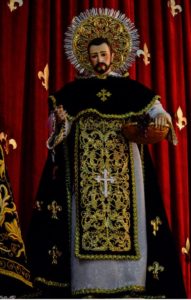 How was St Juan Macias’ preaching particularly Dominican?
How was St Juan Macias’ preaching particularly Dominican?
Dominican preaching can be characterized by its source, its method, and its relationship to the vow of poverty. The source for Dominican preaching is contemplation and Juan’s preaching drew from this source. His preaching resulted from an overflow of his robust prayer life. Juan, based on numerous examples from his canonization documents, was a man of prayer who led a deeply contemplative life. His preaching to the many who knocked on the convent door each day was drawn from his deep love of the rosary and remarkable penitential life. This was the source of grace that made his preaching effective and sustaining.
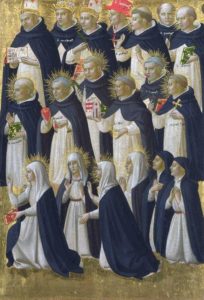 St. Juan Macias’ method of preaching was particularly Dominican. Dominicans preach on the move in a wide variety of settings to diverse audiences. It is a way of preaching that is flexible, adaptable, and versatile. Juan preached to a wide variety of visitors who came to the monastery. His preaching began with listening, with encountering people right where they are. It was not a pre-determined exhortation; it was not top-down. Juan preached in a milieu where a diverse range of people came to the convent with a variety of needs. Juan, as a lay brother, preached to the community daily with his versatile preaching.
St. Juan Macias’ method of preaching was particularly Dominican. Dominicans preach on the move in a wide variety of settings to diverse audiences. It is a way of preaching that is flexible, adaptable, and versatile. Juan preached to a wide variety of visitors who came to the monastery. His preaching began with listening, with encountering people right where they are. It was not a pre-determined exhortation; it was not top-down. Juan preached in a milieu where a diverse range of people came to the convent with a variety of needs. Juan, as a lay brother, preached to the community daily with his versatile preaching.
Juan’s preaching was enhanced by his poverty. From the founding of the Order by St Dominic, Dominicans have forged strong links between poverty and preaching. Dominicans have embraced the vow of, the practice of, and the spirit of poverty. For Dominicans, living out poverty enlivens the preaching. Dominicans have embraced poverty in order to free themselves for the mission and to authenticate what is said in their preaching. Dominicans seek to combine the spiritual movement of abandonment with a unity between the preacher and his ministry to the poor. In order to save souls and evangelize people in light of the Gospel, Dominicans must practice what they preach. And, by their movement of poverty, their life of simplicity and mission inspired others to live the Gospel message and reach out to those in need. A lay brother, by his very vocation, is poor and is one with the poor. Brothers, as non-ordained members of the Church, relinquish all trappings and privileges of the clerical life to remain simply a brother. St Juan Macias’ practice of poverty and his vocation as a lay brother helped him to preach to the poor and outcast who knocked on the door of the convent.
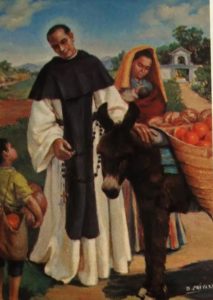 As a Saint of the Order of Preachers, Juan Macias was a holy preacher. He lived out the fullness of his Order’s charism, preaching to those who came to the convent seeking various physical, mental, emotional, and spiritual needs regardless of his nonclerical status. He was a man of prayer who lived a rigorous and penitential life as a Dominican lay brother. Juan was deeply contemplative and was extremely observant of his religious rule. He lived out his mission as a preacher by encountering hundreds of people every day while fulfilling his duties as the porter for the convent, feeding, instructing, evangelizing, and healing. He is a saint who speaks to the heart of the Dominican preaching life.
As a Saint of the Order of Preachers, Juan Macias was a holy preacher. He lived out the fullness of his Order’s charism, preaching to those who came to the convent seeking various physical, mental, emotional, and spiritual needs regardless of his nonclerical status. He was a man of prayer who lived a rigorous and penitential life as a Dominican lay brother. Juan was deeply contemplative and was extremely observant of his religious rule. He lived out his mission as a preacher by encountering hundreds of people every day while fulfilling his duties as the porter for the convent, feeding, instructing, evangelizing, and healing. He is a saint who speaks to the heart of the Dominican preaching life.
St Juan Macias, intercede for us. Help our Church to re-discover the vocation of the religious brother.
 By: Br. John Steilberg, OP
By: Br. John Steilberg, OP
Province of St Albert the Great
(Central USA)
September 2021
Brother John serves currently as the Executive Director of Operations at Aquinas Institute of Theology, a Catholic graduate school of theology in the Dominican tradition, located in Saint Louis, Missouri.